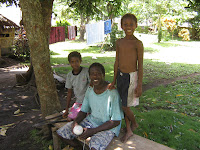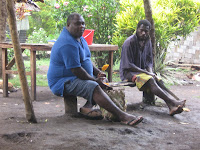Good Morning,
It's 7:30am on Super Bowl Monday here in Port Vila. There was a burst of sudden internet connectivity last night that allowed me to post so many pictures, but it appears to have left me. So, there won't be any new pictures this morning, but I can explain the others. There's a way to add these captions to the original post directly, but its all but impossible without the page timing out. Frankly, I'm thinking it a small miracle that I can post anything. Years of working with a computer doesn't do one much good in Vanuatu.
If you'd like to make some sense of yesterday's pictures, I recommend opening that post in a separate window. Here are the captions.
1: In mid-November, on my second week on Epi, I took a little "business trip" around the island. Robinson (yellow shirt on my left), a local Agriculture Officer, Marco (green shirt on Robinson's left, one of the 4 area secretaries on Epi, and Michael (taking the picture), a Shefa livestock officer from Vila, were set to tour about ten villages on Epi describing a promoting the upcoming Livestock Day on Efate. Michael was trying to get villages to send small livestock to Port Vila to sell there. Well, I found out about the trip the morning they were set to leave and weaseled my onto the truck with them. We traveled for four days, sleeping in the villages and making stops along the way where Michael and Robinson would tout Livestock Day. After they gave their speech, they would introduce me and I would give my twenty minute talk-talk about why I'm on Epi and how I would like to work with them. By the time we had reached far off Ngala, we had our traveling sales pitch pretty worked out and I was rattling off Bislama the whole way.
One of the last villages we visited was Moriu, home to Laura, a volunteer starting her third year in Vanuatu. She's the white face to my right. Her host papa is standing on the right in the white shirt. The large thatched building is the village nakamal, were everyone was summoned for the meeting. There's one in every village and they serve as city hall, court house, all around meeting place, and during la-fetes, good places for the men to gather and butcher cows.
2: Looking out of the nakamal at Moriu, you can see there new tam-tam. A tam-tam is a tree carved into a statue/drum. Notice the slit down the middle. When it's time for a meeting, the locals hit the sides with a stick to summon everyone. Radio Vanuatu plays the sound of tam-tams before making announcements.
3: Marco inside the nakamal. Marco is one of the four area secretaries I work with. Since we were traveling through his area on Epi, he was in charge of us and arranged things with the villages. Marco lives in nearby Malvasi, so I see him regularly. I've gotten to rely on him for explanations about what the heck is happening around me.
4: Me and Michael, the visiting livestock officer, having breakfast in Nikaura. It's not morning in Epi unless there's boiled bananas.
5: The view from Nikaura. That's Ambrym in the far distance. The night before, the Ambrym volcano had been active, and you could see the red beacon from the shore.
6: Lopevi, a small island visible from Northen Epi. The story is that after the volcano became active again, the people of Lopevi came to Epi and are now in Ngala village. There's is reportedly one old man still living on the island who just didn't want to leave home and comes to Epi regularly in his canoe to grow food that can't be grown there. This is one of many non-verifiable stories that may or may not be true, but I actually believe this one if for no other reason than that the people of Laman island do make the two hour canoe ride to Epi regularly to tend to gardens they have on Epi and then row back with a canoe full of bananas.
7: Another tam-tam at another nakamal. The swirl in the forehead is probably representative of the round pig tusks that are one of the main symbols of vanuatu. The round tusk is present on the flag, the money, and on the labels of Tusker brand beer.
8: I'm following Michael, Marco, and Robinson. We took a truck from one village to where the road ended, then walked along this remarkable beach for about half a mile so we could get into a small speed boat at the end that took us across the bay to Ngala. All so that we could have yet another meeting about livestock and why on Earth I'm volunteering in Epi.
9: Michael is a kava fan and wanted me to take a picture of him pounding kava root before steeping, squeezing, and drinking the stuff. This is the main method for making kava on Epi, unlike Efate where they use a mince meat grinder, or on Tana where you chew it and then have a virgin boy squeeze it for you. A volunteer on Tana explained to me that since women are *ahem* unclean, they may not touch a man's food after cooking it and may not squeeze kava. Men who touch women are just as unclean so only virgin boys can squeeze the kava. Epi has no such rules as far as I can tell.
10: Papa Robinson and Mama Seesie's house. Yes, that's a motorcycle, but no, it doesn't work. Seesie and Robinson are my neighbors and essentially part of the family. Like my host family, they are part of the Seventh Day Adventist church and live on our little SDA third of the village.
11: Another view of Robinson's house. This is a slightly patriachal society, though not consciously so. People will instinctively tell you that this is Robinson's house and refer to Robinson's family, but if I were to call it Mama Seesie's house, no one would think twice about that.
That little shelter in the middle is where they keep and wash their dishes and the kitchen house is on the left.
12: Spot or Spotty, our dog whom Papa Daniel insists is lazy because he sometimes doesn't follow the family to the bush.
13: Robinson's house again. Papa Daniel built this house and as a testament to his craftsmanship notice the thatched overhand and, wonder of wonders, this house is L-shaped!
14: My house! My papa built this house with the help of one other man and it's a mansion. Look at that cement foundation and that natangura (thatch) roof.
15: Another view of my house. I can close up those windows in the forground, but not the ones in the back. Yes, there's a wooden door and it has a lock. The family just put the calico there for decoration I think.
16: This is the shelter by my grandma's kitchen where we sometimes gather for meals. Pumkins and snake beans grown on top. The building in the back on the right is grandma's (Apu's) kitchen.
17: That's my swim house where I take my twice daily bucket baths. Have you noticed yet that there's a separate building for everything? A family may have one or two main houses for sleeping and generally living, a swim house, a smol haos (toilet), a kitchen, and maybe a wash house or a tool shed. There are also little shelters about and benches since we spend most of our time outside anyway.
18: Apu blong mi (right) and Mama blong mi (left) are using split sticks to place hot stones on top of lap-lap leaves. Lap-lap leaves are like banana leaves and are used when you make, you guessed it, lap-lap, the traditional dish of Vanuatu. The mashed banana, manioc, taro, kumala, or yam is wrapped between two layers of leaves and those stones are going to cook it for several hours.
19: Anthony and me in Natakoma, my training village on Efate. I vaguely remember a time when I lived in a house with walls and ceiling like that.
20: My host family in Natakoma are inspecting my little globe. Papa Thomas is showing where you can find Vanuatu.
That's what I can offer for now. There will hopefully be more to come when I'm able.
Daniel


 More carving. I helped a little, but this was early enough in my stay on Epi, that they still thought I was too fragile for much physical labor. That's changed whether I like it or not and I am no longer given a five year old to accompany me if I head out to the bush.
More carving. I helped a little, but this was early enough in my stay on Epi, that they still thought I was too fragile for much physical labor. That's changed whether I like it or not and I am no longer given a five year old to accompany me if I head out to the bush.



































